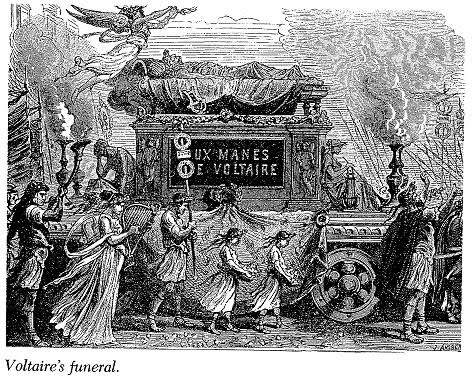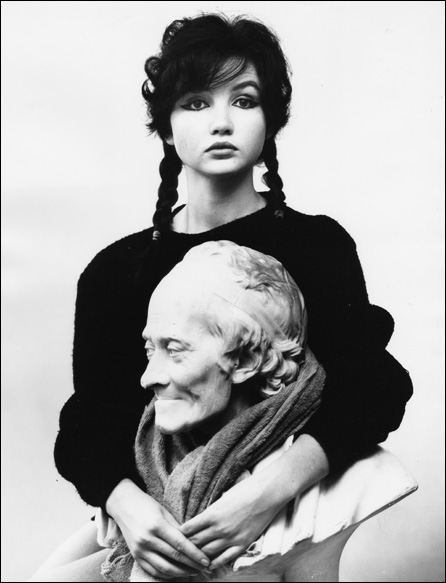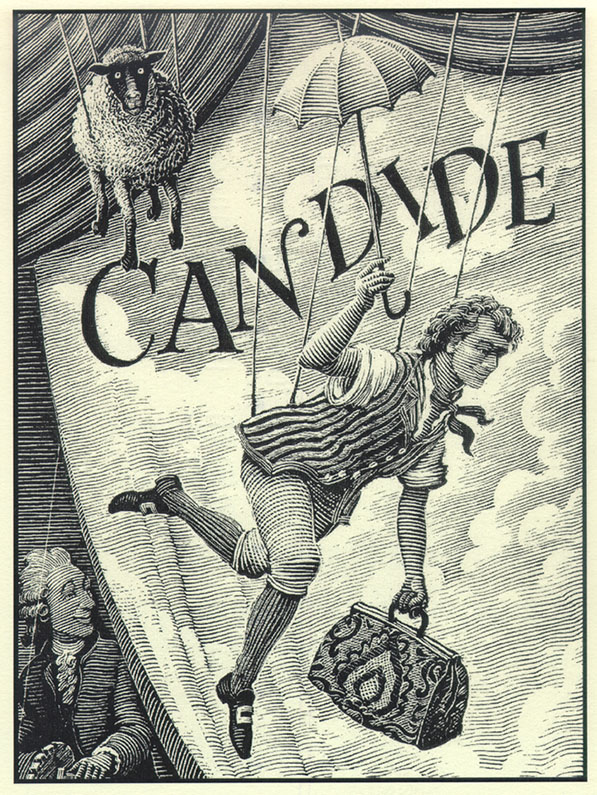Voltaire. The name conjures up many associations. Intelligent, radical, revolutionary. But who really was Voltaire? ….
He was not, as has been said,a profound thinker. He taught men to question every legend, every conventional idea transmitted to them by their parents, and to believe nothing that could not be confirmed by the evidence of the senses. He exposed shams. Since the whole structure of society at the outset of the eighteenth-century was founded on make-believe, the blast of his irony, the flame of his sarcasm had a withering effect. He was one of the most potent destructive writers that ever lived; but he was not constructive.

---Another leading principle of Voltaire’s was his belief in freedom of religion. Throughout his career, he steadfastly opposed religious intolerance and persecution. Although Voltaire believed in God, he firmly opposed most religious dogmas, and constantly presented the view that organized religion was basically a sham. Quite naturally, Voltaire never believed that the titled aristocrats of France were wiser or better than he, and his audience learned that the so-called “divine right of kings” was a lot of nonsense. Although Voltaire himself was far from a modern-style democrat (he tended to prefer a strong but enlightened monarch), the main thrust of his ideas was plainly opposed to any form of hereditary rule. It is therefore not surprising that most of his followers came to favor democracy.---Read More:http://manoemano2010.blogspot.com/2010/04/most-influencial-people-in-world.html
The supreme intellectual, as distinct from emotional influence of the eighteenth-century was that exercised by Voltaire. Voltaire ( 1694-1778) taught three generations that superstition was ridiculous, sentiment absurd, fanaticism unintelligent, and oppression infamous. He was a brilliant satirist rather than a constructive or even logical philosopher. His open quarrels with the eminent became the talk of Europe; and although his literary taste was questionable, his political and philosophical apothegms changed the thinking habits of the civilized world.

---Keeping Voltaire Cosy… ...with an old towel. A bit of silly fun from Sam's studio in Johannesburg taken around 1962. This image, scanned from a print, is a perfect reminder of how serious Sam was about the photography itself, while having unashamed fun with his image making. Also present, the classic Sam Haskins signature duo of sex appeal and humour.---Read More:http://www.samhaskinsblog.com/?p=753
He was the inventor of that critical habit of thought which sapped faith in the established system, which deprived the upper classes of its self-confidence, and which became one of the causes of the French revolution. Thus, when in 1791 the Revolution had triumphed, the National Assemby decreed that his coffin should be removed from the distant village in which he had been buried and transported in state to the Pantheon in Paris.

---"God is a comedian playing to an audience too afraid to laugh" (Voltaire) ---Image:http://listverse.com/2007/08/13/top-15-banned-literary-classics/
Escorted by the National Guard, it rumbled through the streets of Paris in a hearse designed by the painter David and bearing the inscription, “He taught us to be free.” The funeral procession was followed by a hundred thousand mourners, and the windows, the balconies, and the sidewalks were packed with further thousands gathered to acclaim its passage. The hearse halted outside the Palace of the Tuileries, and stopped at the house on the Quai des Theatins- Quai Voltaire- where he had died. It was there that the two daughters of Calas, whom he had defended against oppression, stepped forward and kissed the coffin. The crowds cheered and sobbed.

---The illustrations to Voltaire's La Pucelle became racier and racier over the years. The one above is from around 1819. Read More:http://www.sexualfables.com/Voltaire-La-Pucelle.php
Then on to the Comedie Francaise, where a huge placard carried the words, “he wrote Oedipe at seventeen”; to the Theatre Francais, where another placard proclaimed, “he wrote Irene at eighty-four.” At last the vast procession reached the Pantheon and the coffin was carried to its vault.
Twenty-three years later, when the Bourbons were restored to the throne, the reactionaries had his bones, together with those of Jean Jacques Rousseau, exhumed from the Pantheon and cast into a pit outside the city, where they were consumed by quick-lime. This posthumous revenge was not discovered until 1864, when the coffin, on being opened, was found to be empty. It at least prove
at the adherents of the old regime regarded him and Rousseau as their bitterest enemies.
---For many Muslims the name Voltaire is one held in anathema. His rationalism is not the issue, but he is forever scarred as the author of a play in which Mahomet is the icon of fanaticism. While it is obvious that the real target of the play was Catholicism and not Islam, the mere fact that Muhammad becomes the scapegoat is a difficult trope to accept for quite a few Muslims. But Voltaire often praised Islam in contrast to the blood-crazed Christianity of his day. Consider the following comment: The legislator of the Muslims, a powerful and terrible man, established his dogmas with his arms and courage; however his religion became indulgent and tolerant. The divine institutor of Christianity, living in peace and humility, preached pardon, and his holy, sweet religion became, through our fury, the most intolerant and barbaric of all.---Read More:http://www.arabnewsblog.net/2010/08/03/voltaire-on-islam/
Although it is correct to acclaim him as a great champion of the freedom of thought and expression, although he was assuredly the unflagging and unflinching opponent of oppression, whether political or religious, it would be an error to describe him as a revolutionary. If he had any ideal of human government, it was the Platonic ideal of the philosopher king, assisted by an elite of cultivated nobles. He did not believe that all men were created equal, nor did he possess any real conception of liberty as a balance of rights and duties guaranteed by an impartial and known system of laws. He was an absolutist; but whereas Rousseau desired the dictatorship of the proletariat, Voltaire desired the dictatorship of kings.
Thus, whereas he was constantly extolling freedom of thought and expression as secured in England, he felt that the central government had every right to prosecute those who openly attacked them. He refused to accept, or even to recognize, Montesquieu’s distinction between despotism and constitutional monarchy. The very idea of a limited central authority was to him abhorrent. He wrote, “no government can in any manner be effective unless it possesses absolute power.” He had no sympathy whatsoever for the common man. “Once the populace begins to reason,” he wrote Frederick the Great, “then everything is lost. I abominate the idea of government by the masses.” One of his most frequent mottoes was a line from Racine: Que Rome soit toujours libre et Cesar tout-puissant. …
ADDENDUM:
Confronting the challenges facing the changing Arab world requires a new vision of society, politics, and economics. But where will this vision come from? Many leaders of the protest movements have emerged, but yet to emerge is an Arab counterpart of Voltaire and Rousseau. What made the French revolution more than a fleeting moment of storming the Bastille are the ideas of Enlightenment thinkers that found their ways into salons and cafes. Their ideas of equality, liberty, and fraternity resonated with French society at large. The Arab world would do well to remember that although Maximilien Robespierre secured the death of France’s last king, Louis the XVI, it was the ideas of the enlightenment that ultimately shattered the institution of the monarchy and paved the way for the creation of a new society governed by democratic principles and liberal values.Read More:http://www.thenewsignificance.com/2011/05/09/islam-qasem-where-is-the-arab-voltaire/ …
…The Arab world has had its caliphs, sultans, and sheikhs, but it has not had a Voltaire. Never has the Arab world more urgently needed an Arab Voltaire who can break the false dichotomy between tradition and progress. This Arab Voltaire is not against public piety but speaks out for the separation between religion and state. His mission is to bring Arab society to the forefront of the 21st century without marginalizing its cultural values or its Islamic tradition and yet standing steadfastly against fanaticism, backwardness, and intolerance.
Without an Arab Voltaire it is difficult to see how the Arab world can escape the cycle of authoritarianism. The force of the uprising may unseat one dictator, but what could stop another from seizing power? Read More:http://www.thenewsignificance.com/2011/05/09/islam-qasem-where-is-the-arab-voltaire/





 COMMENTS
COMMENTS